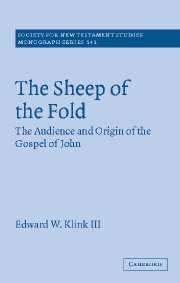Book contents
- Frontmatter
- Contents
- Acknowledgments
- List of abbreviations
- 1 The audience and origin of the Gospels: introduction and method
- 2 Early Christian community: a study of the community construct and its functional potential in early Christianity
- 3 Early Christian Gospel: Gospel genre and a critique of the two-level reading of the Gospel of John
- 4 Early Christian reader: an explication of the audience of the fourth Gospel by inquiring for the implied reader
- 5 Reading the fourth Gospel: the function of the Gospel of John in light of the Gospel community debate
- 6 The sheep of the fold: summary and conclusion
- Bibliography
- Index
6 - The sheep of the fold: summary and conclusion
Published online by Cambridge University Press: 22 September 2009
- Frontmatter
- Contents
- Acknowledgments
- List of abbreviations
- 1 The audience and origin of the Gospels: introduction and method
- 2 Early Christian community: a study of the community construct and its functional potential in early Christianity
- 3 Early Christian Gospel: Gospel genre and a critique of the two-level reading of the Gospel of John
- 4 Early Christian reader: an explication of the audience of the fourth Gospel by inquiring for the implied reader
- 5 Reading the fourth Gospel: the function of the Gospel of John in light of the Gospel community debate
- 6 The sheep of the fold: summary and conclusion
- Bibliography
- Index
Summary
Nearsly thirty years ago Robert Kysar did a complete survey of scholarship on the Gospel of John. When summarizing the results of the investigation Kysar noted that one of Johannine scholarship's recent accomplishments was that “Contemporary Johannine criticism has confirmed that the gospel is a community's document.” Kysar claimed that the inclinations long found in scholarly literature have confirmed in a substantial manner that the FG must be interpreted as the document of a community:
The works associated with source-tradition and composition criticism, the quest of the concrete situation of the evangelist, and theological analysis have all merged upon a common tenet: The contents of the gospel are the result in large part of the conditions of a community of persons … The theology of every stratum of the gospel relates to the community of faith; it addresses the needs of that community at that moment … The gospel cannot be read meaningfully apart from some understanding of the community out of which and to which it was written … its thought is sustained in the atmosphere of that occasion and nowhere else.
Such a statement describes well the paradigm that this study has attempted to correct. It is notable that nearly thirty years later Kysar has moved in the opposite direction. Concerning the importance of knowing “as much about the [historical] occasion as possible,” Kysar now concludes:
An investigation of the past usually tells us more about the investigator than the past … Maybe we are just learning that the testing of any hypothesis is an ongoing necessity and that working hypotheses do not always “work” without flaw … As I am grateful for the work of scholars like Brown and Martyn, I suppose I have simply tired of playing the game of abstract speculative constructions.
- Type
- Chapter
- Information
- The Sheep of the FoldThe Audience and Origin of the Gospel of John, pp. 247 - 256Publisher: Cambridge University PressPrint publication year: 2007



